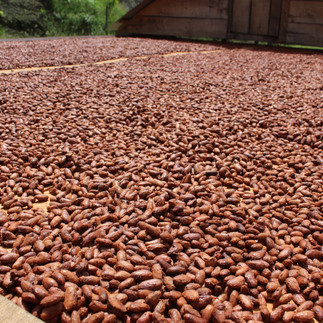Cacao Made With Love From Finca Dos Vistas - Aripo, Trinidad
- Kalei Ross - inpursuitofpurity

- Jul 6, 2021
- 6 min read
Updated: Jul 13, 2021

According to Eurococoa.com:
"Cocoa trees grow exclusively in areas that meet certain specific conditions. The cocoa belt is an area of land around the equator between 20 degrees latitude north and south. Most cocoa even grows within 10 degrees of the equator."
"Cocoa cultivation initially spread into the immediate vicinity of the original habitat of the cocoa tree: from Brazil and Mexico to Central America and the Caribbean area."
At the southernmost tip of the Caribbean chain lies Trinidad and Tobago, the dual-island Caribbean nation, the largest of the two being Trinidad.
In 2004 Frances L. Bekele wrote an article entitled “The History of Cocoa Production in Trinidad and Tobago”. The author stated that,
“Cacao (Theobroma cacao L.) has contributed to the socio-economic development of Trinidad and Tobago for over 200 years, and the history of the local cocoa industry has undoubtedly been illustrious. The Spaniards first planted the Criollo variety in Trinidad in 1525.”
“By 1830, Trinidad and Tobago was the world’s third highest producer of cocoa, after Venezuela and Ecuador, producing 20% of the world’s cocoa.”
“Subsequent to 1921, when local cocoa production peaked at 75 million lbs (34,000 tons), a combination of events led to the gradual decrease in production. World cocoa prices declined due to a glut on the market resulting from over-production, particularly in West Africa, then came the onset of the Great Depression of the 1920’s, the appearance of Witches’ Broom disease (WB) in Trinidad and Tobago in 1928, the increase in world sugar prices, and the development of the local oil industry, which competed for agricultural labour.”
“Over the last three decades, cocoa production, exports, acreage under cultivation and farmer participation in Trinidad and Tobago have been declining steadily.”
“Without proper intervention, cocoa production in Trinidad and Tobago may diminish further. It is desirable to develop the local cocoa industry since there is a ready market for all of the cocoa the country can produce because of its high quality and lack of restrictive quotas…”
Despite the seemingly grim outlook for the Trinidad cocoa industry, there are individuals who possess a true love for cacao and desire to play a role in seeing it regain its esteemed position in the local culture and its reputation around the world. Thanks to the Finca Dos Vistas team composed of Richard Cruz, Alicia Reis, and Ebony Chisholm, the production of high quality cacao that is actually made with love continues to flourish in the heart of Aripo.
While many cacao farmers in Trinidad come from generations of families deeply rooted in the industry, the Finca Dos Vistas team does not have cacao in their familial roots. However, this young team with no cacao heritage to speak of has cacao pulsing through their veins. They literally live and breathe cacao. They took it upon themselves to research, experiment, and put in the hard work to make it happen. They are establishing their own legacy through the love and care that is clearly evident in their work, and they are getting quite a bit of attention for it.
They are living out their mission statement, which is:
To provide consistent quality cacao and chocolate and maintain the cultural traditions associated with Trinidad's long history with cacao.
Their love and careful attention to the processing of cacao beans has led them to become Aripo’s central fermentery center, as they take in wet beans from other farmers, ferment and process them, then sell the beans. In an industry where it is far easier to sell one’s plantation than put in the labor to grow cacao, Finca Dos Vistas' efforts have helped the small farmers in the area who may not have connections to exporters or chocolate makers stay in business.
This is not merely work for them; this is a way of life and a craft they are continuously refining. When asked, “What makes cacao so special that you have dedicated your life to your craft?” each team member responded from the heart.
Richard Cruz:
Cacao is a culture and way of life that I find so appealing. From planting it to pruning to harvesting, and through all the steps of processing and fermentation and drying have a deep appeal that draws me in completely. I am constantly learning how to do things more effectively and efficiently. I love visiting other farms and plantations and marveling at the similarities and learning from the differences. Trinidad has had such a long history that the old methods work very well and it is very rare to find an area that needs innovation. I find it so wonderful to experience a field where the elders can still teach us as so often new technologies render their experience obsolete; not so in cacao where their experience still works best. I am a very willing receptacle of their knowledge and traditions and I wish to maintain them.
Alicia Reis:
I have a special relationship with cacao and I say that after God is cacao. I think that cacao is very generous and I would say loving. It is very sensitive and easily affected by impurities and so must be well cared for. It has given me and other farmers hope for the future as it does not see age. It gives itself to the old and the young, and anyone who tends to it lovingly, it is a source of income and food and has so many uses. I feel honored to be given the opportunity to work with something so genuine. You get back exactly what you put in. If you put in your honest work then you will get an excellent product. No shortcuts and no cheating. I am happy to work with my team of Richard and Ebony and the farmers of Aripo and our success is their success as we all share the same dream.
Ebony Chisholm:
For me I always had the dream of owning and successfully running a farm like my foreparents did, so as to keep the farming tradition going in my family as I have noticed that the interest in farming amongst my generation is very very little. I have always valued the stories of how my grandparents built their homestead and business through farming by using what their environment provides. My Mom and I who both have that dream of having a farming business together were fortunate to learn about cacao through our dear friend and partner, Richard Cruz, who has a special passion for cacao and farming and is very knowledgeable and dedicated in this field. So it was pretty clear from the beginning of getting to know each other that we share similar values and goals in this agricultural venture. So having a sound team I felt confident to pursue cacao farming with my Mom and Richard. Of course from the moment I first saw a cacao pod I was so amazed by it, the taste of the fresh beans and of course learning how to make chocolate with it. Cacao and chocolate became a fruit that intrigued me and also the culture of farming it in Trinidad all was so exciting to learn about and be a part of. The next factor that makes cacao farming worth devoting my life to is the many health benefits. Cacao farming is physically demanding, particularly picking the cacao pods and maintaining the cacao fields and so it's important to be physically active. Another very important aspect to farming cacao is that it is a super food rich with many nutrients which keeps my body nourished and healthy. I also love that what I do can inspire other young people to do farming, and because I do it full time and successfully, I hope that parents will support their kids who want to do farming in general so we can finally get rid of looking down on farmers and stigmatizing farmers as less than, but instead value farmers as one of the most important career paths someone can get into, especially young people. Now that we are the central fermentors of Aripo, I have seen other young people showing an interest in my community and beyond. A great help with that is through social media, whatever we share about our farming lifestyle inspires others, and social media also helps us connect with other young farmers, and thus we are able to form a strong farming network where we can support each other. So having chosen cacao farming has helped me accomplish all the goals that I wanted for myself, my family, my community, and my country as a whole, and now through social media I am able to share my life with the world.
Not only has this team been processing and selling their superior cacao beans, but they also make their own drinking chocolate, which is affectionately named 1525 after the year the Spaniards planted the first cacao trees in Trinidad, and they recently started making handcrafted 67% dark chocolate bars.
It seems as though there is nothing that this team can’t do as they are simply living out their mission statement and living it out successfully. They are a true inspiration to anyone who wants to keep the tradition of growing and processing superior cacao alive and to chocolate lovers around the world. Now there is another reason to love and appreciate the cacao beans and chocolate from Finca Dos Vistas - because they are truly made with love.


Reference:
Bekele, F.L. (2004). The History of Cocoa Production in Trinidad and Tobago. Pages 4-12 in Proceedings of the APASTT Seminar – Exhibition entitled Re-vitalisation of the Trinidad & Tobago Cocoa Industry, 20 September 2003, St. Augustine, Trinidad.






















Comments